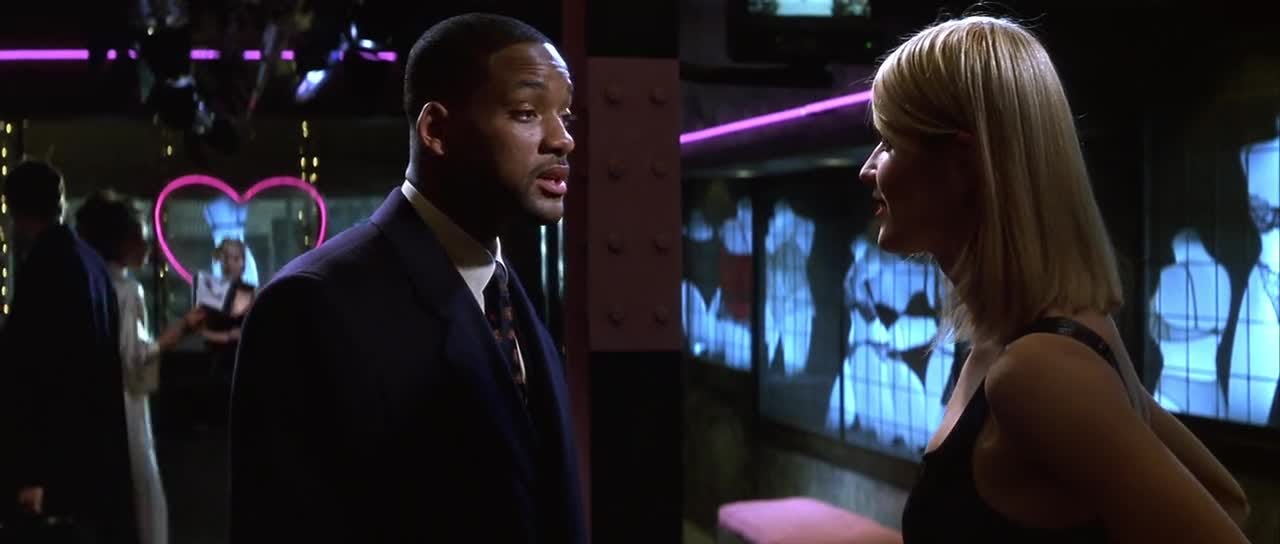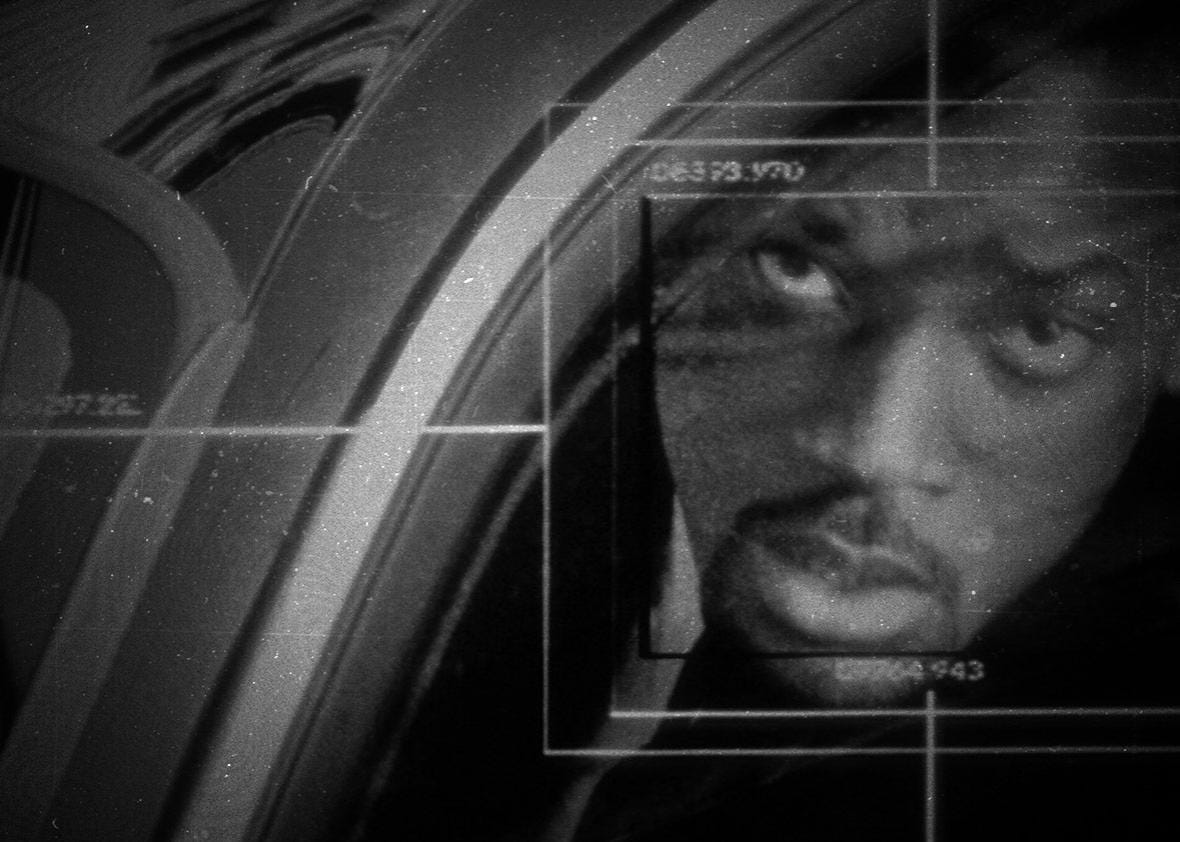“You’re either very smart,” one character says to another not once but twice in Enemy of the State, “or incredibly stupid.” That’s how I feel about the film. It seems like a smart movie, but I’m pretty sure it isn’t. The Tony Scott-directed surveillance thriller is often credited with predicting the PATRIOT Act and the entire post-9/11 surveillance state, but it doesn’t predict anything particular about that issue besides its outsized existence in American political culture. It’s just a classic “wrong man” thriller in which advanced surveillance technologies are used by rogue government agents to cover their tracks. In real life, the controversy over surveillance is about the government preemptively targeting wide swaths of innocent people, not tracking and murdering potential whistleblowers in broad daylight (we don’t think). It’s a popcorn movie in the guise of an intelligent thriller for grownups. Depending on how you look at it, it’s either very smart or incredibly stupid.
The “wrong man” is Robert Dean (Will Smith) a labor lawyer who unwittingly receives video footage of a Congressman (Jason Robards) getting murdered by a senior NSA agent (Jon Voight). The prologue explains things succinctly—the Congressman is going to vote against a PATRIOT Act-esque bill that would dramatically expand the NSA’s surveillance powers, so they kill him for it. Dean ends up with the footage when an old law school buddy (Jason Lee) who inadvertently captured video footage of the assassination, bumps into Dean at a lingerie score and secretly drops it into his bag. Dean becomes the focus of the NSA’s investigation. Chase scenes ensue.
I need to stop at this point and talk about the lingerie store, which is unlike any that exists in reality. Dean pops in to buy a Christmas gift for his wife (Regina King). He has apparently never been there before and is flustered to discover it’s one of those places where the saleswomen walk around the store wearing the lingerie. You know, like in real life. Dean has an awkward conversation with one of them about his wife’s measurements, and the saleswoman, after retreating to the back for a moment, returns with a woman who opens her robe to show him the bra and underwear in question. The whole place feels more like a brothel than a legal business, or, perhaps more accurately, a 12-year-old boy’s fantasy of what goes on inside a lingerie store.
The 12-year-old boy in question is director Tony Scott, who is mostly known for shepherding juvenile male fantasies onto the big screen. He struck gold with Top Gun, Beverly Hills Cop II, and Days of Thunder, and then began moving into more substantive material like True Romance and Crimson Tide, without ever losing his affection for macho cool. That’s the problem with Enemy of the State, in which he conjures his share of thrills and laughs but is too obsessed with coolness to even attempt to tackle the thorny politics of the story.
It starts with Will Smith’s performance, which barely skims the surface of a character that could have been rippling with ambiguity. An important subplot involves Dean’s relationship with Rachel Banks (Lisa Bonet), his ex-girlfriend from college with whom he had an affair several years prior to the film’s events. He and his wife spent a year in therapy and got over it, we’re told, but Dean maintains a professional relationship with Branch, using her to get to Brill (Gene Hackman), an ex-CIA agent who does illegal surveillance on demand for good guys like Dean. These meetings with his ex-flame all take place behind his wife’s back, and a more curious filmmaker/actor duo would want to explore the moral grayness of a man who comes up with professional reasons to keep up a personal relationship that almost wrecked his marriage. They might even, if they were so inclined, effectively tie this to the misery Dean endures over the course of the film, like it was some sort of karmic punishment. That’s the kind of angle that would have been artfully examined in a ‘70s conspiracy thriller like Three Days of the Condor, The Parallax View, or The Conversation, all of which serves as a loose inspiration for Enemy of the State. But Smith isn’t interested in that type of characterization, instead portraying Dean as an innocent victim, and Scott is happy to oblige his simplistic portrayal.
Enemy of the State is more into the stuff than the people, anyway. Scott casts a murderer’s row of rising young male stars as the NSA operatives, including Jack Black, Seth Green, Barry Pepper, Scott Caan, and Jake Busey, none of whom get to do any acting but look pretty cool sitting in front of computer screens, manipulating satellites with just the stroke of a keyboard. Scott delights in their ability to track Dean throughout the streets, back alleys, and rooftops of Washington, DC, and as a filmmaker, you can’t blame him. When you remove the moral and political implications, surveillance is just gonzo documentary filmmaking, and Robert Dean is his unwitting star.
Francois Truffaut once said, and I’m paraphrasing here, that it was impossible to make an antiwar film because the very act of staging war turns it into some sort of grand adventure, even when the death and bloodshed are underlined. Visual portrayals of war trigger some sense of primal play in humans, especially men. Surely the same is true about surveillance. Can any filmmaker effectively critique the surveillance state? Or do they connect too deeply to the desire to capture our humanity? Is it just too much fun? To portray surveillance as unethical or evil might require more introspection than most filmmakers could muster. On some level, they must get a giddy thrill out of the invasion of privacy, for what else is a movie but an invasion of the actors’ and characters’ privacy? That’s where drama comes from. Surveillance is filmmaking. Brian De Palma (Blow Out) and Peter Weir (The Truman Show) knew it. Everyone else is still struggling to catch up.
Scott in particular was not a filmmaker equipped to tackle these questions. His juvenile mind likes scantily-clad women, gadgets, and movie stars, and he’s not particularly interested in self-examination. That’s okay. There are plenty of viewers who want that sort of thing (this movie made $250 million at the box office). But the very of existence of Enemy of the State produces a thrill of anticipation that the film fails to live up to. It’s so prescient in its centering of surveillance in the political conversation that it’s disappointing how little it does with it. We desire a stronger take, a more thorough examination, and a few more ideas. As it stands, it’s just a nifty thriller that’s less than meets the eye.






Your piece is clearly more thought-provoking than than movie, especially the section that questions if filmmakers can even depict the surveillance state with an unbiased view. I still want to see this one, maybe good for the elliptical.
This is a superb piece, Noah! I remember loving this film as a freshman in college, when I didn't know films well enough to expect much. You have explained beautifully what is hollow about it. The lingerie store in particular sounds EXACTLY like something Tony Scott (or Michael Bay) would have done. And did. So juvenile. But the movie is undeniably fun to watch, as you said.